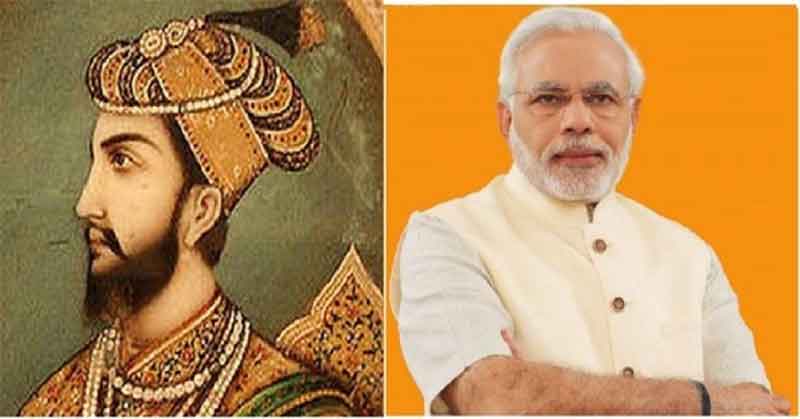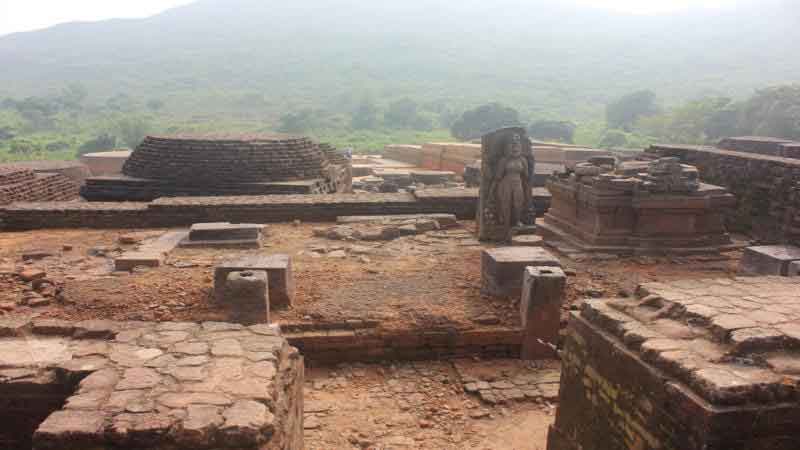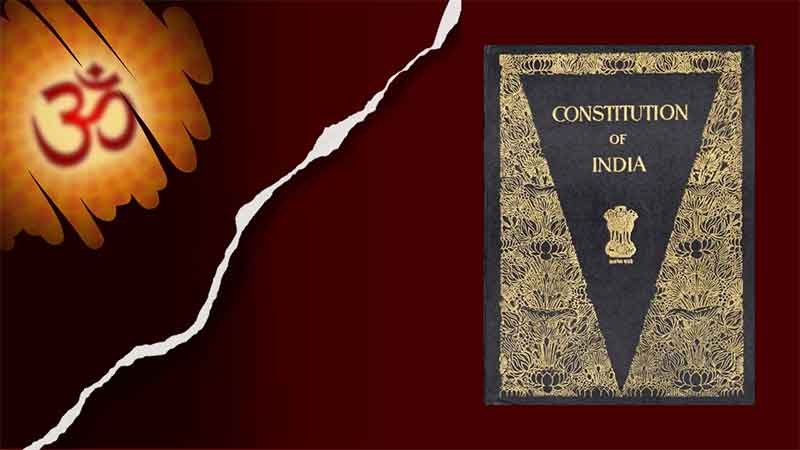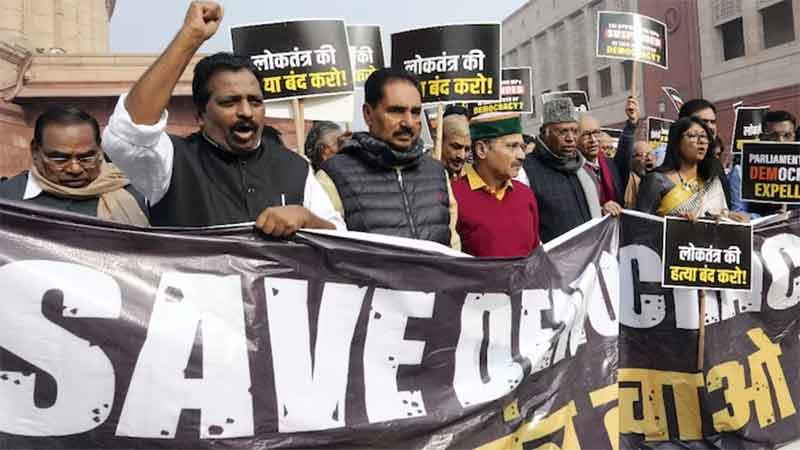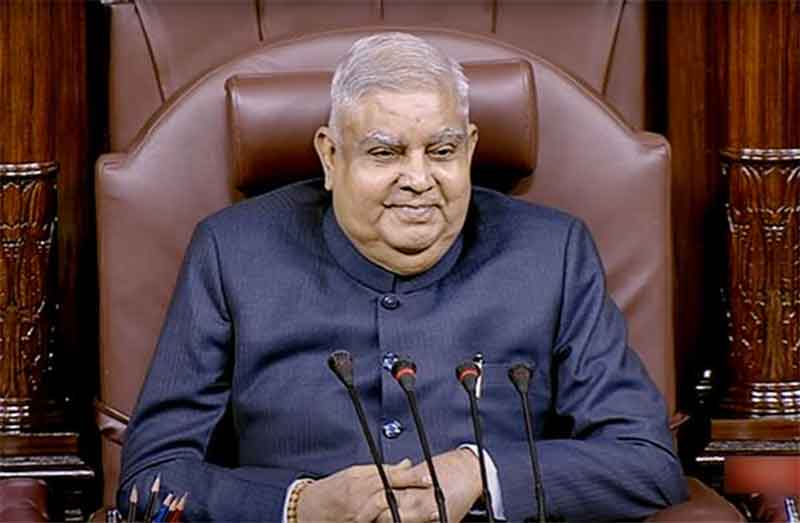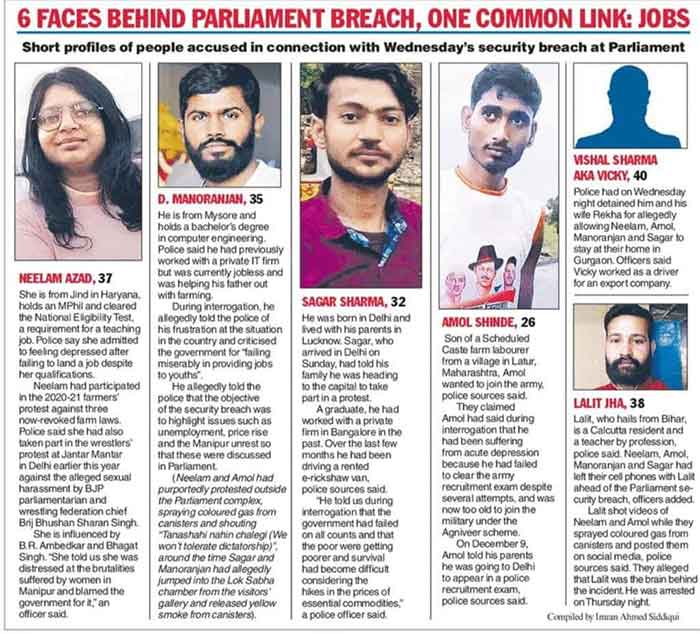
Karl Marx’s oft-quoted observation – “History repeats itself, the first time as a tragedy, and the second time as a farce” keeps echoing in the corridors of the Indian Parliament. Twenty two years ago, on December 13, 2001 there was a Pakistan-sponsored terror attack on Parliament where its security personnel at that time fought off the terrorists and laid down their lives to protect the premises. On the same date of December 13 of 2023, as the nation was mourning that tragedy of the past, an incident happened inside the very premises of the Lok Sabha. It was a replica of that past attack by invaders, but bloodless. While in 2001, the security guards prevented the terrorists from entering the Lok Sabha hall, this time they failed to prevent two young men from gaining access to its public gallery, from where they jumped into the floors of the House. But instead of exploding a bomb, as the MPs feared, they opened a few canisters which released thick yellow smoke ! None of the MPs was reported to have suffered any ill-effect from the smoke. Some among them even claimed to have caught hold of the two accused (who did not have any armed weapon) and beaten them before handing them over to the security personnel – an achievement for which they were hailed as “saviours of the day” by the other MPs ! To demystify the event, the entire episode looks like a farce – a parody of the tragedy that happened on that date twenty two years ago.
Significantly enough, these two young men while opening the canisters, shouted the slogan: “Tanashahi nahi chalegi” (dictatorship will not be allowed). At the same time, outside the premises of Parliament, their two friends opened similar canisters and raised slogans: “Tanashahi nahi chalegi,” “Bharat Mata ki jai,” and “Jai Bhim, Jai Bharat.” The two who burst open the canisters inside the Lok Sabha, have been identified as Manoranjan D (34), an unemployed computer science engineer from Mysuru, Karnataka and Sagar Sharma (24) an e-rickshaw driver from Lucknow in Uttar Pradesh. The other two who demonstrated outside Parliament echoing similar slogans were Neelam Verma (35), a government job aspirant from Jind district in Haryana, and Amol Shinde (24) an Army aspirant from Latur in Maharashtra. After their arrest, they told the Delhi Police that they shared “collective responsibility” for the act that they carried out, in order to make themselves heard and catch the attention of the government. All the four were arrested and booked under the anti-terrorist UAPA (Unlawful Activities Prevention Act), and charged with ‘provocation with the intent to cause a riot, criminal conspiracy, trespass, obstructing public servants and terrorist acts.’
Soon after their arrest, the Delhi police went on a frantic search for their leader Lalit Jha who was identified as the kingpin behind the entire drama. They failed to trace him, till Jha himself sometime later, appeared before the police and surrendered at Kartyavya Path a few yards away from Parliament – thus choosing his own time to turn himself in and denying the Delhi police the opportunity to claim his arrest. Yet, another slap on the face of the police ! In order to prove their efficiency and recover from the ill-reputation that they had gained after the scandalous breach of Parliament security, the security forces are now on a spree of arrests.
With every passing day, more and more people are being nabbed from far-flung parts of the country – accused of hatching a conspiracy. A non-violent demonstration of protest in the premises of Parliament is being blown out of all proportions by the government and its pet media, as a sinister plot hatched by anti-national forces to destroy the sacred Temple of Democracy – equating it with the terrorist attack on Parliament on the same date some twenty two years ago.
It is interesting to note that none of these people accused in connection with the latest incident on December 14 in Parliament, tried to escape and hide elsewhere (as terrorists usually do). Unlike the deceptive anonymous operation (like suicide bombing by terrorists) , they openly carried out their acts (which did not harm any one) while announcing in public their objectives that highlighted their grievances. Can these be designated as `terrorist acts’ under the UAPA ?
The voices that they wanted to be heard
Let us look at the background of these four and their associates, and the way they had to cope with problems when growing up in early and mid-2000, as revealed from the extensive interviews carried out with their families by journalists. Manoranjan, unable to get a job even after his expertise as a computer science engineer, was reduced to the position of a help hand in sheep breeding and poultry business in Mysuru in Karnataka. Imagine the sense of frustration that he must have felt. His father Devaraje said that his son found relief in his spare time reading books ranging from Che Guevara’s treatise on guerilla warfare to Chanakya’s Arthashastra. In another corner of the country, in Lucknow, Sagar Sharma was forced to stop studying due to his family’s financial difficulties and took to e-rickshaw driving. In his old diaries, preserved by his parents, he gave vent to his desire for protesting against the ruling order. In an entry, dated June 13, 2015, he wrote: “ I have pledged my life to the country …to free the country from slave mentality…”. His social media account is full of quotes from Che Guevara and Bhagat Singh.
Meanwhile, up in the north in Jind in Haryana, a woman M.Phil from the OBC community, Neelam Verma, frustrated in her efforts to get a job, was turning into a rebel. She acquired the name `Neelam Azad’ after her participation in the farmers’ agitation and the women wrestlers’ protest in Delhi, and due to her steadfast defence of the rights of the poor farmers of her village. Even after her arrest, Neelam continues to enjoy the support of her village Khap Panchayat which held a meeting demanding her immediate release and withdrawal of charges under UFPA.
In the western state of Maharashtra, in Latur, another young man, Amol Shinde was beset with similar feelings of frustration. Coming from a Scheduled Caste family of farmers, he first tried to enter the Army, but failed because he had already crossed the age limit, and since then had been attempting to clear the police recruitment exam. Uncertain about the results, he left home on December 10, telling his parents that he was going to Delhi for a recruitment rally.
In Bihar in the east, Lalit Mohan Jha, the son of a village priest graduated in science and wanted to be a doctor. His path in that direction being blocked by adverse circumstances, he had to migrate to Kolkata and give tuitions to make ends meet. Imagine his sense of frustration. His father Devanand Jha defended his son’s act, saying that raising a voice against unemployment was not treason and his son must be released immediately. (Times of India. December 17. 2023)
It was all these young people who got in touch with each other through the social media, and decided to bring to attention their long standing grievances in the gaze of their elected representatives in the Lok Sabha. Given the current trend when only loud demonstrations of protest can wake up these somnolent MPs, they took resort to that means. Now it has kicked up a storm, where both the ruling BJP and the Opposition parties, while blaming each other, are united in agreeing that the security of Parliament, the `Temple of Democracy’, had been breached by this group of young protestors.
Demystifying the sacrosanct image of the `Temple of Democracy’
By using the term `temple’ to describe Parliament, both the ruling party and the Opposition are reducing it to the status of a religious institution that demands absolute obedience from devotees, who have no right to challenge draconian laws passed by it through a brute majority. This sacrosanct right of Parliament is being misused by the members of the ruling party to give immunity to its recalcitrant MPs from prosecution. A BJP MP who insulted a Muslim MP still occupies his bench, while Opposition MPs are disqualified at the drop of a hat for some innocuous comment they may have made against the `supreme leader,’ the honourable Prime Minister. Yet, the Indian Parliament is being valorized as the `Temple of Democracy.’
It is this sanctimonious claim that was challenged by the group of young dissenters who intruded into the premises of Parliament on December 13. While the state and the media can continue to brand them as anti-national conspirators, we should welcome them for exposing the double standard followed by the ruling party that dominates both houses of ParIiament. In fact, soon after the incident, when members of the Opposition wanted the home minister Amit Shah to come and explain why the security breach happened (since he is in charge of security), the hypocrisy came out in its crassest form in the Rajya Sabha. Objecting to the Opposition demand there, its chairman Jagdeep Dhankar (a BJP politician who is also the Vice-President) indulged in an obnoxious demonstration of intolerance. He jumped up from his seat, and shouted at the Opposition MPs, wildly gesticulating at them. His conduct – that was televised and went viral – was a blot on the reputation that this upper house had enjoyed in the pre-Modi days. He has reduced himself to a butt of ridicule – a typical example of the Sangh Parivar’s style of behavior.
In a sharp contrast to this unseemly angry outburst by an elderly politician, the youngsters who entered the Lok Sabha gave voice to their feelings in a form that conveyed a serious message through a light-hearted act. To start with, in their youthful mood, they played a prank. They tricked a BJP MP from Karnataka into giving them a pass to enter the Lok Sabha, and thus they managed to throw mud at the face of the very ruling party to which he belonged. In their next move (described as a `conspiracy’ by an infuriated Delhi Police), they managed to combine the tactics of protest within Parliament with that outside its premises – with their associates raising slogans that highlighted problems like unemployment, inflation and also the continuing turmoil in Manipur (thus suggesting an intention to include wider issues).
An alternative path of protest for the unemployed youth ?
The December 13 demonstration of protest in the Lok Sabha floors should draw our attention to the unheard voices of an unorganized segment of the deprived people – the unemployed. While the industrial workers have their trade unions to assert their rights and win their demands, the farmers have their Kisan Sabhas which empowered them to carry on an agitation that forced the government to withdraw oppressive farm laws, the unemployed youth have no organization to bring all of them together from different parts of India to empower them to put pressure on the government to address their grievances.
Yet, they constitute a large segment of our disadvantaged population. According to the World Bank report of 2022, India’s youth unemployment rate was 23.22% – higher than Pakistan (11.3%), Bangladesh (12.9%) and Bhutan (14.4 %). More staggering data have come out from the Azim Premji University, which in its report entitled: State of Working India 2023: Social Identities and Labour Market Outcomes, has revealed that 42% of graduates under 25 are unemployed. One can well imagine how many outside their circle, who are forced to be school drop-outs due to the financial constraints of their parents, remain unemployed today.
The two main actors in the December 13 Lok Sabha drama, and their associates represent these sections of our people, and are giving voice to their long standing grievances – as evident from their utterances in public as well as statements made in police custody. Their attempt to get together in some form of organization over the last two years (according to the chargesheet filed by the police) fructified on that day in Delhi. Their group, consisting of young people from all corners of India, represents an initiative to build up a trade union like organization. Can they bring together all the unemployed – ranging from the skilled educated graduates at the upper layer to the unskilled school drop-outs at the lower level – on a common platform that can pressurize the ruling powers to open up avenues for jobs for all of them at different levels in various sectors ?
Sumanta Banerjee is a political commentator and writer, is the author of In The Wake of Naxalbari’ (1980 and 2008); The Parlour and the Streets: Elite and Popular Culture in Nineteenth Century Calcutta (1989) and ‘Memoirs of Roads: Calcutta from Colonial Urbanization to Global Modernization.’ (2016).

